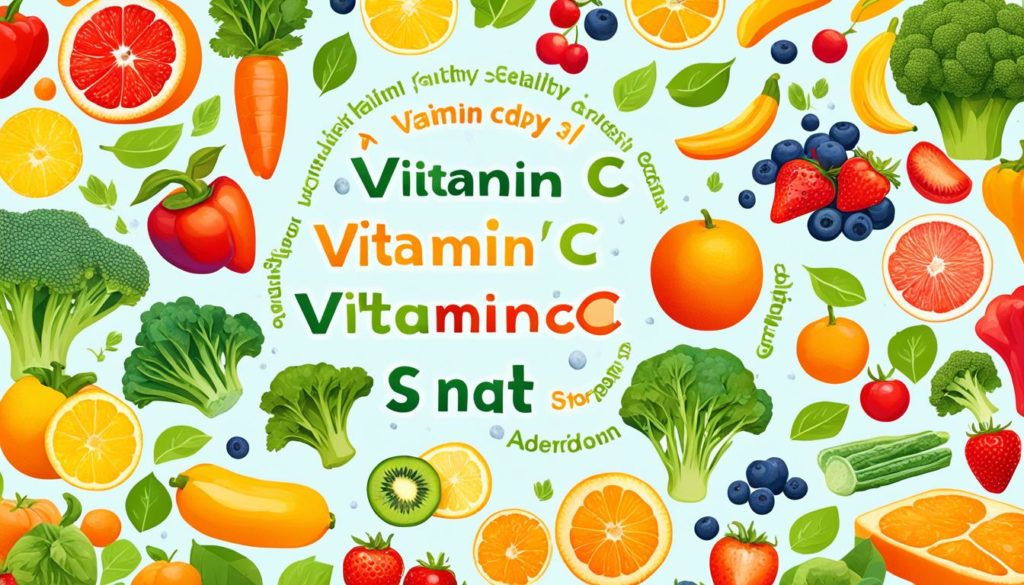Vitamin C, also known as ascorbic acid, is key to our health. It’s crucial for many body functions. This nutrient helps make collagen, L-carnitine, and some brain chemicals, according to the National Institutes of Health.
The American Journal of Clinical Nutrition states Vitamin C boosts the immune system. It also helps prevent heart diseases. Another study from Dermato-Endocrinology shows its benefits for the skin. It fights aging and shields us from the sun’s harm.
Key Takeaways
- Vitamin C is pivotal for the biosynthesis of collagen and certain neurotransmitters.
- It enhances immune function and may prevent cardiovascular diseases.
- Ascorbic acid has potent antioxidant properties, protecting cells from damage.
- It contributes to skin health with anti-aging benefits and UV protection.
- Vitamin C intake supports overall well-being and essential bodily functions.
The Role of Vitamin C in the Body
Vitamin C, known as ascorbic acid, is crucial for our health. It boosts collagen production and fights off antioxidants. These roles are vital for our overall well-being.

Antioxidant Properties
Vitamin C shines as a strong antioxidant. It fights free radicals that can harm our cells. The Journal of Clinical Biochemistry and Nutrition shows Vitamin C can protect us from oxidative damage. This protection is essential for our cells and tissues.
Collagen production is key, too. It helps the body fight against oxidative stress.
Collagen Synthesis
Vitamin C plays a big role in making collagen. This process is crucial for skin, vessels, and bones. The Orthopedic Journal of Sports Medicine notes Vitamin C’s role in collagen, which is important for connective tissues. This helps repair tissues and keeps our body’s structure stable.
Antioxidant benefits are important for our overall structural health, as well.
| Function | Impact |
|---|---|
| Antioxidant Protection | Neutralizes free radicals, reduces oxidative stress |
| Collagen Synthesis | Supports connective tissues, skin, bones, and blood vessels |
Benefits of Vitamin C for Skin Health
Many studies have shown how strong Vitamin C is for skin health. It’s famous for its antioxidant abilities. Vitamin C is crucial for anti-aging skin care and sun protection. It is celebrated for boosting collagen, which improves skin texture and lessens wrinkles.

Anti-Aging Effects
Vitamin C is great for anti-aging because it ramps up collagen creation. The Linus Pauling Institute points out, it helps smooth out wrinkles and betters skin texture. This is why it’s key in anti-aging skin care. Vitamin C keeps the skin firm and stretchy, giving you a younger look.
Protection Against UV Damage
Studies prove Vitamin C shields skin from sun damage. It fights off harmful free radicals from UV rays. A piece in the Journal of Investigative Dermatology shows it cuts down UV-caused cell damage. So, it saves the skin from early aging by keeping it healthy.
Vitamin C and Immune Function
Vitamin C is key for a strong immune system. It plays a big role in fighting off illnesses. This nutrient helps different parts of the immune system work better. This keeps you healthy.
One top Vitamin C benefit is boosting white blood cells. Like lymphocytes and phagocytes, they help beat infections. MedlinePlus says these cells are crucial. They attack invaders to keep us safe.
Also, Vitamin C makes the immune system stronger. It helps protect your skin and other barriers. This is important for preventing respiratory infections too.
Many studies show Vitamin C’s power in boosting immunity. Research in the Nutrients journal backs this up. Vitamin C helps fight respiratory and other infections. It acts as a strong guard for our health.
Adding enough Vitamin C to your diet is vital. It plays a big role in immune support. Eating foods or taking supplements that are rich in Vitamin C helps. It makes your body better at fighting off illnesses.
Natural Vitamin C Sources
Eating natural foods is the best way to get Vitamin C. We’ll look at fruits and vegetables rich in Ascorbic Acid. These foods give you a good amount of this vital nutrient.
Fruits Rich in Vitamin C
There are many fruits full of Vitamin C. This variety means there’s something for everyone to enjoy:
- Oranges and Citrus fruits: Oranges, lemons, limes, and grapefruits are famous for their Vitamin C levels.
- Strawberries: Strawberries are tasty and rich in Vitamin C.
- Kiwis: Kiwis are small fruits that are big in Vitamin C.
- Guavas: Guavas are often overlooked but have lots of Vitamin C.
Vegetables High in Vitamin C
Many vegetables also offer a lot of Ascorbic Acid. They play a key role in a balanced diet:
- Bell Peppers: Bell peppers come in various colors and are loaded with Vitamin C.
- Broccoli: Broccoli is full of nutrients, including plenty of Vitamin C.
- Brussels Sprouts: These small veggies are a great source of Vitamin C.
- Leafy Greens: Greens like spinach and kale are not just Vitamin C-rich. They also have many other vitamins and minerals.
To boost your diet, add these fruits and vegetables. They’ll help you meet your Vitamin C needs every day.
The Impact of Vitamin C on Heart Health
Research shows impact of Vitamin C is big on heart health. Studies link Vitamin C to cardiovascular benefits. An analysis in the American Heart Association journal Circulation shows high Vitamin C intake lowers heart disease risk.
People eating more Vitamin C are less likely to get heart problems. This shows Ascorbic Acid’s impact in fighting heart disease. It suggests Vitamin C is key in keeping the heart healthy.
Harvard School of Public Health research backs this. They say dietary Vitamin C guards against heart disease. So, adding Vitamin C to your diet helps your heart stay healthy.
Ascorbic Acid impact is about more than just nutrition. It helps in complex heart functions. Getting enough Vitamin C from food or supplements is vital for heart protection.
Vitamin C Supplements: Pros and Cons
Vitamin C supplements are getting more popular. They come in different forms like tablets, capsules, and powders. The goal is to boost your diet and keep you healthy.
Forms of Vitamin C Supplements
People choose their supplement form based on what they prefer and how well it works for them. Vitamin C tablets are a common choice. But there are other options too, such as:
- Capsules: They’re easy to take and release slowly.
- Chewables: Good taste and suitable for all ages.
- Powders: You can mix them with drinks.
Every form has its benefits, making sure there’s a good option for anyone.
When to Consider Supplements
There are certain times when taking Vitamin C is very important. This is especially true for people who don’t get enough from their diet or have special health needs. The Mayo Clinic says supplements are helpful when you’re really stressed or sick.
However, it’s important to be careful with how much you take. Too much Vitamin C can upset your stomach. Finding the right balance is key for better health.
Importance of Vitamin C in Preventing Diseases
Vitamin C, or ascorbic acid, is key in preventing diseases. It’s because of its strong antioxidant properties. The Global Antioxidant Project notes that Vitamin C can cut the risk of chronic diseases. It fights oxidative stress well.
Vitamin C boosts our immune system. It also helps lessen the risk of some cancers. The European Journal of Cancer shows how Vitamin C’s antioxidants help in this fight.
Vitamin C does more than boost immunity. It also helps our bodies absorb and use iron better. This keeps us healthy. For more on how Vitamin C aids in iron absorption, check this resource.
Vitamin C’s role in health is vast. It’s important for making collagen and boosting our immune system. To dive deeper into the biology of Vitamin C, read this publication.
- Combats oxidative stress.
- Potential reduction in chronic diseases.
- Enhanced iron absorption and metabolism.
Vitamin C has a huge effect on our health. It provides key nutrients that our immune system needs. It’s crucial in stopping diseases from happening.
Understanding the Correct Vitamin C Dosage
It’s important to get the right Vitamin C dosage for your health. Let’s look at how much you need every day and the risks of taking too much.
Recommended Daily Allowance
The Office of Dietary Supplements sets the daily Vitamin C needs. For grown-ups, women should have 75 mg and men need 90 mg. These amounts are key for antioxidant defense and building collagen.
Potential Overdose Risks
Taking too much Vitamin C is rarely dangerous, but it’s good to know the signs of too much. The National Health Service says staying under 1,000 mg daily is wise. Too much can upset your stomach, cause discomfort, and increase kidney stone risk. Keeping an eye on your intake is best for enjoying its benefits safely.
Vitamin C in Different Life Stages
Vitamin C is key for health at all ages, helping our bodies function well. Each age group needs different amounts. Knowing these needs from childhood to old age is important for staying healthy.
Vitamin C for Children
Young children need the right amount of Vitamin C for their health. The American Academy of Pediatrics says kids’ Vitamin C needs grow as they do. This vitamin helps their immune system, supports growth, and prevents health issues.
Vitamin C for Adults
Adults need Vitamin C for healthy skin, protection against illness, and more. Getting enough Vitamin C is crucial for good health and avoiding long-term illnesses. Eating foods high in Vitamin C or taking supplements can help meet these needs.
Vitamin C for Seniors
Older adults face higher risks of diseases, so Vitamin C is vital for them. The Journal of Gerontology suggests it can lower disease risk and boost immunity. A diet rich in Vitamin C can improve seniors’ life quality and lifespan.
FAQ
What are the essential health benefits of Vitamin C?
Vitamin C supports the immune system, skin health, and fights against damage by free radicals. It’s a key player in making collagen, L-carnitine, and certain brain chemicals. Plus, it helps keep hearts healthy and makes skin look better.
How does Vitamin C function as an antioxidant?
As an antioxidant, Vitamin C stops free radicals from causing harm, which helps prevent diseases. This action reduces damage to the body and supports good health.
Why is collagen synthesis important, and how does Vitamin C aid in it?
Making collagen keeps our connective tissues, skin, blood vessels, and bones strong. Vitamin C is vital for creating collagen, helping with tissue repair and keeping skin healthy.
What are the benefits of Vitamin C for skin health?
Vitamin C fights aging by reducing wrinkles and improving skin’s feel. It protects against damage from the sun by stopping free radicals, which keeps skin healthy.
How does Vitamin C support the immune system?
It boosts the immune system by helping produce protective white blood cells. Vitamin C strengthens the immune system, keeping the body safe from infections.
What are some natural sources of Vitamin C?
Foods rich in Vitamin C include citrus fruits, strawberries, kiwis, and guavas. Bell peppers, broccoli, Brussels sprouts, and greens are also great sources.
What impact does Vitamin C have on heart health?
Vitamin C may reduce the risk of heart disease. It acts as a guard against different heart conditions, lowering the chance of coronary disease.
What are the pros and cons of Vitamin C supplements?
Supplements boost Vitamin C levels for those lacking, but too much can upset the stomach. They come in tablets, capsules, chewables, and powders.
How does Vitamin C play a role in disease prevention?
Vitamin C might lower the chance of chronic diseases by fighting oxidative stress. Its antioxidant properties may also help prevent some cancers, benefiting overall health.
What is the correct dosage of Vitamin C?
The recommended dose varies by age and sex; 75 mg for women and 90 mg for men. Avoiding too much is key, with a maximum safe level of 1,000 mg daily to prevent stomach issues.
How do Vitamin C requirements differ across various life stages?
Vitamin C needs vary through life. Kids need less, but as we age, the requirement grows. For seniors, it’s important for fighting age-related troubles and boosting immunity.


